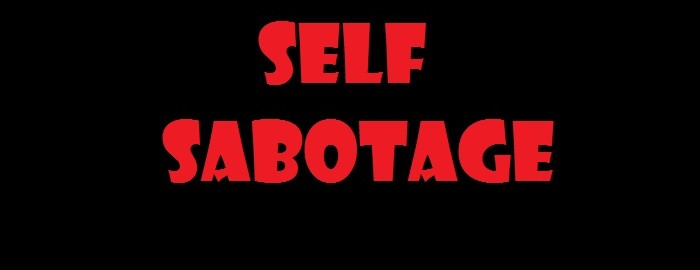Self Sabotage: You Only Have Yourself to Blame
“You only have yourself to blame.” – Dr. Albert Castanon
First, let me clarify the idea that you are to blame for your problem… As adult we choose the story we want to tell. We choose the story we want for our lives. As adults, free to make choices, we are the willing victims of those who would keep us from our highest potential. As children we might have been victims. And NO child is to blame themselves for abuse that causes scars that in adults result in addiction, self abuse and self sabotage. Yet as adults we are free to find help to cope with the past if it keeps us from living the life we desire. As adults we choose self sabotage when we choose to not seek help or support. As adults we choose to hold onto stories that somehow always seem destine to be repeated. To those not willing to change your story, self sabotage will surly find you no matter how successful you become.
I am a self proclaimed expert in and on the topic of self sabotage. I’m fascinated by it. I’ve not only actively engaged in the process of sabotaging areas of my life but I’ve had the fortunate experience of watching others destroy their lives while working for many years in the casino industry. I’m not taking this topic lightly… in fact I believe self-sabotage is the single greatest problem facing people today.
Self sabotage is the leading cause of death among Americans. I’m making a generalization, but if you take heart disease, diabetes, respiratory disease, addiction related causes of death, and suicide together are leading causes of death among different demographics. While many of these causes of death are very different one thing they have in common is these are diseases related to behavior. Many of these causes of death are the result of poor choices that resulted in crippling diseases or sudden death. But the disease is not what killed the person. What kills people are the choices we make on a daily basis that leads to poor health. The choice to overeat, drink to much, smoke, or the lack of willingness to get help, from a therapist, coach, or any number of professionals is the very definition of self sabotage.
Self sabotage is when we know what we want to do, we know how to do it, but we are unable to take action toward what is best. Take for example, lunch… When I go to lunch, I know the chicken salad is what my body needs. I know it would taste great. I really like chicken salads! But I choose the burger and fries. Make this choice over years in one’s life and don’t be surprised when the doctor says you have heart disease, or diabetes, or hypertension, all caused by consistent choices that hurt your health.
Self sabotage is knowing what to do but unable to take action on the behavior that will get us what we want. There are a number of factors that contribute to this but taking an open and honest appraisal at behavior that is personally harmful is a great start.
In another blog post I wrote that commitment to personal growth means there is no right or wrong, only honest evaluation of what works and what doesn’t and the willingness and courage to try something different. Self sabotage is often the result of not willing to change. Identifying behavior that has long term negative consequences is the fist step. Practice these 4 steps to start the process of overcoming self sabotage:
1. Get Honest. We engage in only two behaviors every day, behavior that keeps us stuck or falling backward, or behavior that keeps us pushing forward. Honestly look at your day and ask yourself do I spend more time moving toward my dream or away from it?
2. Take Responsibility. For a while I use to meditate on the following affirmations: My life is my responsibility; Nobody is to blame for the life I choose as an adult; I am the only one responsible for my life. I’m 38 years old, if I’m not happy it’s my choice. If someone is keeping me from the life I want, I get them on my team for support, or I cut them from my life. My life is my responsibility and I own all the good and turn lemons into lemonade.
3. Get Support. Even the greatest athletes in the world have a coach. Support can come from anyone so long as you create healthy boundaries and you clearly articulate your vision and how the other person can support you. Ask for the support you need, not the support someone offers. I recently went to a trainer to work toward some health goals. I asked for what I needed and he proceeded to tell me what he offered. What he offered was not what I needed so I found someone new!
4. Protect Your Success. You can’t outrun self sabotage. Self sabotage is a powerful addiction… You may easily outrun it and cover it up with achievement after achievement but it will catch you when you least suspect it. It starts with a tiny voice that says: your not good enough; your a fraud; you don’t deserve it… If you have a history of self-sabotage, keep a close eye on the negative thoughts. Particularly the one’s that tell say you don’t deserve success. This includes the thought to share or give away the rewards you earn.
In the blog posts that follow I will cover the concepts behind my framework for understanding and building High Performance Psychology, motivation, the change cycle, emotional response to change, and understanding change vs. transformation. A clear understanding of these principles will help you to crate a map to overcome your resistance to having a live filled with love, inspiration, forgiveness, and enjoyment.



